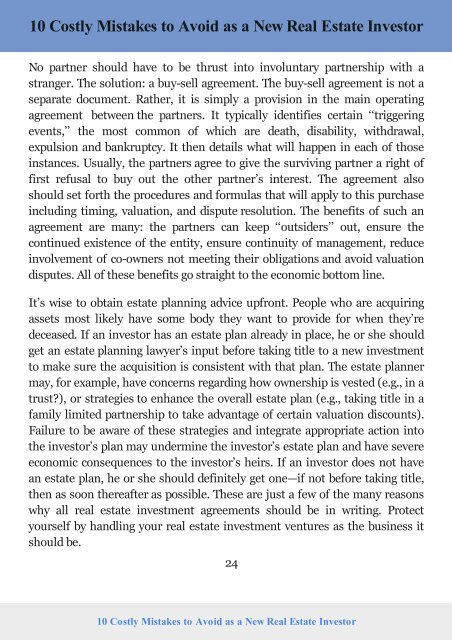ebook proof read april 25
Create successful ePaper yourself
Turn your PDF publications into a flip-book with our unique Google optimized e-Paper software.
10 Costly Mistakes to Avoid as a New Real Estate Investor<br />
No partner should have to be thrust into involuntary partnership with a<br />
stranger. The solution: a buy-sell agreement. The buy-sell agreement is not a<br />
separate document. Rather, it is simply a provision in the main operating<br />
agreement between the partners. It typically identifies certain ‘‘triggering<br />
events,’’ the most common of which are death, disability, withdrawal,<br />
expulsion and bankruptcy. It then details what will happen in each of those<br />
instances. Usually, the partners agree to give the surviving partner a right of<br />
first refusal to buy out the other partner’s interest. The agreement also<br />
should set forth the procedures and formulas that will apply to this purchase<br />
including timing, valuation, and dispute resolution. The benefits of such an<br />
agreement are many: the partners can keep ‘‘outsiders’’ out, ensure the<br />
continued existence of the entity, ensure continuity of management, reduce<br />
involvement of co-owners not meeting their obligations and avoid valuation<br />
disputes. All of these benefits go straight to the economic bottom line.<br />
It’s wise to obtain estate planning advice upfront. People who are acquiring<br />
assets most likely have some body they want to provide for when they’re<br />
deceased. If an investor has an estate plan al<strong>read</strong>y in place, he or she should<br />
get an estate planning lawyer’s input before taking title to a new investment<br />
to make sure the acquisition is consistent with that plan. The estate planner<br />
may, for example, have concerns regarding how ownership is vested (e.g., in a<br />
trust?), or strategies to enhance the overall estate plan (e.g., taking title in a<br />
family limited partnership to take advantage of certain valuation discounts).<br />
Failure to be aware of these strategies and integrate appropriate action into<br />
the investor’s plan may undermine the investor’s estate plan and have severe<br />
economic consequences to the investor’s heirs. If an investor does not have<br />
an estate plan, he or she should definitely get one—if not before taking title,<br />
then as soon thereafter as possible. These are just a few of the many reasons<br />
why all real estate investment agreements should be in writing. Protect<br />
yourself by handling your real estate investment ventures as the business it<br />
should be.<br />
24<br />
10 Costly Mistakes to Avoid as a New Real Estate Investor



